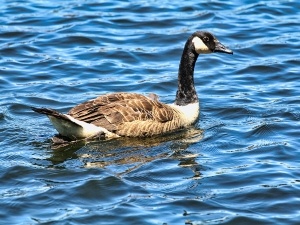
Geese love water, these birds can be seen swimming in and enjoying water bodies in all types of temperatures, even during the cold winter months.
If you’ve wondered how these birds seem to not get cold then this article is for you and will answer the question of: do geese get cold
Table of Contents
Do geese get cold?
All animals have to survive winter at some point during the year, some animals have a warm coat that keeps them warm and other animals relocate to somewhere warm to escape the cold. This is how geese manage the cold:
Geese and the cold:
Geese do get cold, every animal gets cold to some extent, but geese simply have ways of dealing with the cold that keep the birds from freezing to death.
These birds are quite hardy and resilient animals, this is how they keep themselves from getting too cold:
Their feathers:
One of the first lines of defense against the cold in geese are their feathers. These birds have an oil layer on their feathers that keep their feathers dry and clean.
The birds will fluff their feathers creating layers of air and feathers and thus insulating the bird’s body and thus keeping them from getting too cold
If the birds need to, they can use their full coats of feathers to cover their feet and beaks during the colder seasons as well
Their fat:
If you’ve ever eaten goose you’ll know that these birds are quite fatty, they have a fat layer under their skin which not only allows them to stay afloat, but this fatty layer also keeps their bodies warm during the winter times.
The fat layer acts as an insulation layer that keeps the birds warm during colder days and nights.
The fat has a low thermal conductivity meaning that it doesn’t easily transfer cold from the outside of the bird’s body to the inside of the bird’s body and vice versa keeping the bird relatively warm.
Their feet:
Geese don’t have very meaty feet, the skin on their feet has a leathery scaly texture and there is minimal tissue at the feet. The bird’s feet are exposed to cold temperatures but are safe from the cold
These birds have a mechanism that keeps the bird’s feet cool but their bodies warm. As blood travels to the bird’s feet it cools down to a temperature that is close to the temperature outside, thus not much heat loss happens at the bird’s feet.
When this blood moves back up to the bird’s body the blood warms up and once it reaches the body it is warm.
This phenomenon ensures that in a goose, blood moves to the feet which keeps the feet alive but heat loss is minimal thus keeping the birds warm
How cold is too cold for geese?
These birds may have ways to keep their bodies warm but even geese have their limit. If a goose is left outside with no protection against extreme cold temperatures then the bird just may freeze to death.
The bird’s feathers, the fat in their bodies, and the system that keeps their feet warm won’t be much help if the bird is too cold. If your bird gets too cold then the bird can develop frostbite.
You’ll know that your bird has frostbite if the skin on the bird’s feet starts to change color and become discolored, if the feet start to look irritated, if the bird’s feet start to swell, and if the bird’s feed starts to look red.
A bird that is too cold will also have a change in behavior, this bird will try to move around a lot to try to get its body to warm up
What to do:
If your bird starts showing signs of being too cold then you may want to bring them inside where the temperature is less cold than outside.
If however, you think that your bird has frostbite then the best thing to do would be to immediately get the bird professional help by taking the bird to the vet, or better yet, taking your bird to an avian vet.
It is important to get the bird to the vet as these professionals will be better able to treat the bird without worsening the damage
If you cannot get the bird to the vet then apply slightly warm (not hot) water to your bird’s feet, or, you can use a warm moist towel on the bird’s feet.
Avoid using a hairdryer or a heating pad on the bird’s feet as this can damage the feet. Also, avoid rubbing the skin on the bird’s feet as a way of warming the bird up.
If you enjoyed this article then you may also be interested in other duck related articles. Here are some articles that you may be interested in: Duckling Vomiting, Duck Manure Vs Chicken Manure, Why Do Ducks Like Ice Water?, Why Is My Duck Throwing Up Water?, Does Duck Poop Kill Grass?, Duck Eggs Turning Black, How To Keep Ducks Quiet At Night

